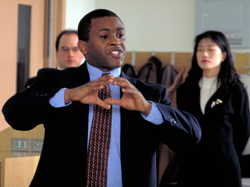
LeaderCoreTM
(Certification of Readiness and Excellence)
Taking Leadership Development to a New Level
By Jacqueline Ghosen
What differentiates a great manager from one who is merely good?
That's the question Jerry Newman asked a number of his human resources clients, such as AT&T, RJR Nabisco, HP and Oshkosh B'Gosh, in the mid to late '90s as he was developing a proposal for a new course in the School of Management's MBA program.
A SUNY Distinguished Teaching Professor and chair of the school's Department of Organization and Human Resources, Newman was not surprised to learn that his clients, and many of the other companies he surveyed, knew the answer. The difference is not intelligence or technical ability. What stands out most about stellar managers is how they conduct themselves, the way they work with others, how they respond in crisis, their listening and communication skills and their ability to motivate others.
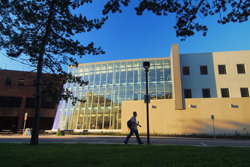
What did surprise Newman was that while companies wanted and needed more exceptional managers, they didn't know how to train them in those highly coveted skills.
"We can train new hires how to use the software and the hardware," one recruiter from IBM said. "But they need to come to us with strong team and leadership skills and they need to be good communicators."
And that's how Leadership PACE was born. PACE (Personal Achievement through Competency Evaluation) was designed as an MBA course based on the belief that success in today's business world depends on more than just technical expertise. Leadership PACE helps students understand and manage themselves and others, and enhances their ability to learn and adapt to new and changing situations.

"PACE students have an opportunity to become more self-aware of their strengths and where they need to improve."
Muriel Anderson
Assistant Professor of Organization and Human Resources
"PACE students have an opportunity to become more self-aware of their strengths and where they need to improve," says Muriel Anderson, assistant professor of organization and human resources. Anderson has been teaching PACE since its inception. "What's more important, however, is that they make a greater contribution in the workplace because they become proficient in the core competencies that are deemed essential for superior performance.
Now, 10 years after the launch of PACE, the School of Management is taking leadership development to a new level.
A New Vision
Today, more than ever, corporate leaders want business school graduates who are equipped with skills beyond industry knowledge and technical ability. Such graduates are "management ready" with the ability to create value for their organizations.

"Before their first classes commence, our MBAs begin a rigorous assessment process to identify the competencies they wish to strengthen."
Nick Everest
Assistant Professor of Organization and Human Resources
The School of Management embraces that challenge through a comprehensive new certification program called LeaderCORE (Certification of Readiness and Excellence). Spanning the entire two years of the UB MBA experience, LeaderCORE gives students the opportunity to study and navigate real-world business situations while developing a set of clearly identified management competencies that differentiate student accomplishments and lead to effective performance in the workplace.
LeaderCORE ensures that graduates will transition seamlessly from business school to leadership-track careers.
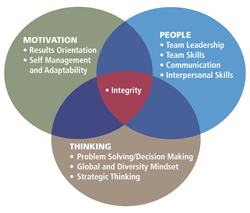
Competency Focused
The driving force behind LeaderCORE is a focus on core competencies considered vital by the business community for effective performance and successful leadership. These competencies are organized into three key leadership dimensions, with integrity as a unifying value:
A Foundation of Experience
For more than a decade, the School of Management has built the foundation of LeaderCORE by learning what employers seek in MBAs and integrating that information into the curriculum. LeaderCORE was developed to expand on the outstanding success of Leadership PACE, and brings together faculty, staff, alumni and business partners interested in developing the skills of the next generation of leaders.
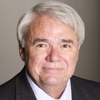
"I've joked that LeaderCORE is like PACE on steroids. But in reality, that's pretty close to the truth."
Jerry Newman
SUNY Distinguished Teaching Professor Chair, Department of Organization and Human Resources
How It Works
The PACE course remains an integral component at the heart of LeaderCORE, but LeaderCORE transcends the confines of the classroom and extends well beyond the scope of a semester or even the school year.

Our learning environment focuses on real-world business situations, such as the Smart car launch.
"Before their first classes commence, our MBAs begin a rigorous assessment process to identify the competencies they wish to strengthen," says Nick Everest, assistant professor of organization and human resources and a key member of the LeaderCORE planning committee. "Next, we help each student create a customized personal development plan built around the competencies they've selected. Then, through the combined efforts of faculty, staff and external coaches, we provide a unique learning environment where the traditional learning model is complemented with new opportunities for our MBAs to develop skills that prepare them to be highly effective in today's organizations and those of the future."
These opportunities are integrated throughout their courses and well beyond, through a vast assortment of co-curricular activities like the Corporate Champions program, internships, case competitions and leadership initiatives that are closely related to and integrated with classroom learning experiences. Throughout the process, a real-world focus is paramount, with emphasis on the skills employers have identified as critical for future leaders. In line with employers' emphasis on accountability, students are expected to manage their own development and capture their progress in a learning portfolio. In their final semester, students present their portfolios and are assessed against the competency model. Those who have successfully developed the competencies receive LeaderCORE certification.
"I've joked that LeaderCORE is like PACE on steroids," says Jerry Newman, LeaderCORE's "visionary" and a key member of the planning committee. "But in reality, that's pretty close to the truth. We've taken an incredibly successful program, broadened the scope, integrated it throughout the MBA experience and capped it with a certification for those who complete the requirements."
The pilot LeaderCORE program began in August 2010, and the first round of MBAs to participate will be eligible for certification in May 2012.
"We anticipate that LeaderCORE will be an outstanding credential for our graduates," says Gwen Appelbaum, assistant dean and director of the school's Frank L. Ciminelli Family Career Resource Center. "We've had so many employers rave about how well prepared our MBAs are after taking the PACE course that we advise students to put PACE on their résumé. LeaderCORE is going to make an even greater impact and will represent the highest standard of leadership development in a business environment that demands exceptional talent."
How Is LeaderCORE Unique?
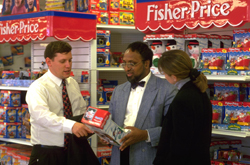
Corporate site visits allow students to see how classroom theory is applied to the business challenges of the real world.
LeaderCORE is different from other leadership programs in a number of ways.
LeaderCORE:
- Creates a highly individualized experience customized for each participant
- Empowers students to assess, develop and demonstrate levels of management readiness
- Encompasses a wide spectrum of competencies
- Engages faculty, staff, alumni and corporate partners as coaches and advisors
- Integrates in-class learning with co-curricular activities
- Results in LeaderCORE certification for those who successfully complete the program
Investing in a Winner
During the developmental stages of LeaderCORE, Professor Jerry Newman introduced the concept to alumnus Rich Floersch, BS/MBA '80, executive vice president and chief human resources officer, McDonald's Corporation. Floersch was most enthusiastic about the idea. "This is exactly what business schools need to be doing," he said. "Students who can work effectively both within teams and in leading teams will always be in high demand. LeaderCORE will ensure this development occurs before they enter the workforce."
In fact, his excitement for the idea was so great that he backed it up with a personal contribution of $25,000 to the School of Management to support the development of LeaderCORE.
If you are interested in having a component of LeaderCORE named in your honor or that of a loved one, named funding opportunities are available for substantial contributions to the LeaderCORE endowment in the following areas:
- Faculty Leadership
- Student Scholarships and Awards
- Coaching Recognition
- Program Marketing
- Student Assessment Tools
- Program Events
For more information, contact Steve Ebsary at stebsary@buffalo.edu or 716-645-3303.

"Students who can work effectively both within teams and in leading teams will always be in high demand."
Rich Floersch, BS/MBA '80
Executive Vice President and Chief Human Resources Officer, McDonald's Corporation
It Takes a Village
The School of Management has enlisted the aid of a cadre of alumni volunteers from the business community to serve as LeaderCORE competency coaches. After students identify the competencies they wish to develop, coaches work with them to strengthen their effectiveness by fostering self-awareness, providing guidance on how to develop the competency and lending appropriate support to the development process.
As the LeaderCORE program grows, the School of Management will need to increase the number of professionals in the coaching database. If you are an alumnus interested in volunteering as a competency coach, you can learn more about the qualifications and requirements by contacting Jill Phinney at jmp8@buffalo.edu. Thanks to technologies such as Skype and videoconferencing, coaches need not be residents of Western New York to participate.
The Foundation of LeaderCORE: What graduates are saying about PACE
"PACE focuses on the soft skills that are so important in today's business world. It has helped me become a much better presenter and communicator, and I am a better leader because of the course. I have seen extremely bright people struggle in managerial roles because they don't have the skills to manage and lead people. PACE definitely helps to bridge that gap."
Umesh Babaria, MBA '03
Vice President, Consumer Deposits Group, M&T Bank"I learned to take a moment before responding, particularly in charged situations. I am also better able to read others and relate to them on their terms rather than my own. As a result, I have been asked to serve on various teams and to lead others."
Christopher Adams, MBA '04
Emission Control Market Specialist, Unifrax I"My competency portfolio follows me wherever I go. When I was seeking employment toward the end of my time in the MBA program, I talked about PACE in every interview. Interviewers were intrigued by it and I loved telling them about the program."
Elizabeth (Lagowski) Astridge, MBA '06
Director of Communications, St. Gregory the Great"On a regular basis, I am challenged with the task of building relationships while also helping to maintain policy. The skills I learned in PACE have helped me recognize how others might perceive my role in the company and my response to situations. I am often required to make decisions and suggest solutions, which was an area of personal development that I identified during PACE. As a result, I have confidence in my abilities and know that I can move forward with certainty."
Valerie Hawthorn, MBA '07
Human Resources Specialist, National Fuel Gas Co."I am better at working with people and understanding their needs. I know how to interact to attain the best possible results for referring clinicians and patients. I also improved my ability to speak in front of a group. In fact, I am giving Grand Rounds this Thursday!"
Stephanie Soehnlein, MD/MBA '07
Radiology Resident, Rochester General Hospital
Learn more about LeaderCORE
